Global Dehydrated and Dried Beans Market - Comprehensive Data-Driven Market Analysis & Strategic Outlook
How will changing nutritional habits and the growing call for for plant-based proteins reshape the global dehydrated and dried beans market inside the coming years? Could improvements in maintenance and processing technologies redefine how these beans are sourced, saved, and fed on international? And as weather change keeps to impact crop yields, what uncertainties may emerge for manufacturers and clients navigating this evolving marketplace landscape?
- The global dehydrated and dried beans market valued at approximately USD 4612.8 million in 2025, growing at a CAGR of around 7.2% through 2032, with potential to exceed USD 7507.6 million.
- Dehydrated Beans Granules account for nearly 56.4% market revenues, driving innovation and expanding applications through intense research.
- Key trends driving growth: Rising consumer demand for plant-based protein and pantry-stable foods., Cost-effectiveness and nutritional value compared to canned alternatives.
- Opportunities include Innovation in quick-cook and value-added seasoned dried bean products.
- Key insight: The market is set to grow exponentially in value over the next decade, highlighting significant growth opportunities.
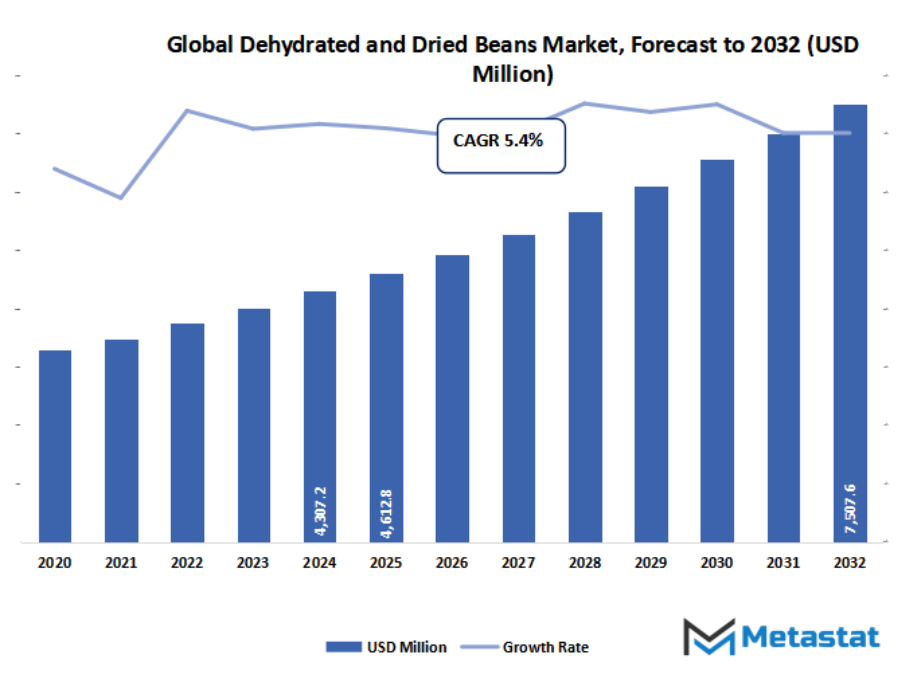
The global dehydrated and dried beans market is in the beginning phases, closely linked with local agriculture and home consumption. Nevertheless, the industrialization of food processing turned it into a globally interdependent industry. The introduction of freeze-drying and air-drying methods enabled the producers to keep the beans' nutritional value and taste while markedly increasing their shelf life. Dehydrated beans, as urban growth continued, were the first ingredient for instant meals and canned soups.
Within the four decades that followed, changing tastes were a factor in the direction that this market took. The consumer demand for plant-based protein alternatives led to the beans being re-discovered as nutritious and versatile. In the next few years, the implementation of technologies like dehydrating systems with low energy consumption and better packaging materials would in turn, define production efficiency and sustainability. Moreover, digital platforms would have more and more influence and form bridges between producers and buyers, thus extending the market's global footprint while at the same time, instituting traceability and quality assurance.
Legislation has had its say in shaping the primary influx of producers as well. Stricter safety and labeling regulations have been the lot of governments and, in turn, producers have embraced healthier processing and more honest sourcing practices. The environment has had a say too and will be a motivating factor for the market to switch to renewable energy and waste reduction.
Geographic Dynamics
Based on geography, the global dehydrated and dried beans market is divided into North America, Europe, Asia-Pacific, South America, and Middle East & Africa. North America is further divided in the U.S., Canada, and Mexico, whereas Europe consists of the UK, Germany, France, Italy, and Rest of Europe. Asia-Pacific is segmented into India, China, Japan, South Korea, and Rest of Asia-Pacific. The South America region includes Brazil, Argentina, and the Rest of South America, while the Middle East & Africa is categorized into GCC Countries, Egypt, South Africa, and Rest of Middle East & Africa.
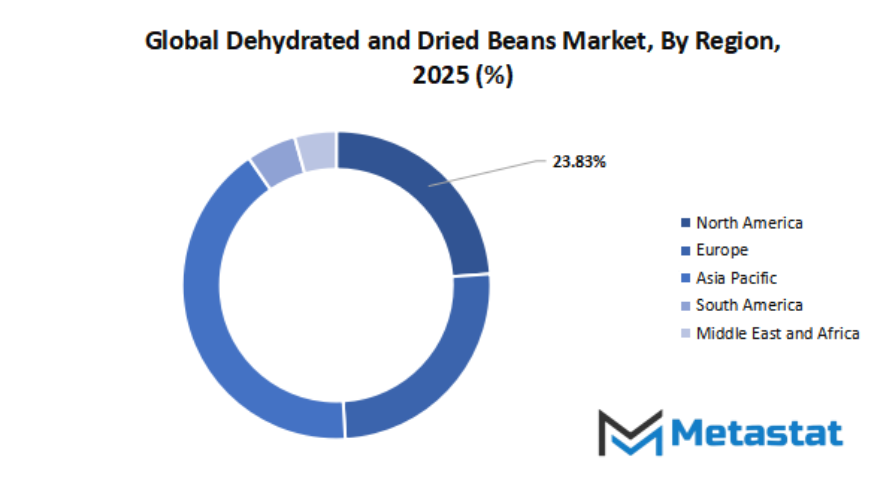
Market Segmentation Analysis
The global dehydrated and dried beans market is mainly classified based on Form, Technique, Application.
By Form is further segmented into:
- Dehydrated Beans Granules
The purpose for this calls for in the global dehydrated and dried beans market is that bean granules have a longer shelf existence and can without problems be incorporated into everyday food. Their texture and flavour retention after rehydration cause them to suitable for geared up-to-eat meals manufacturing. Growing purchaser interest in brief meal preparation will maintain to drive the demand for this shape.
- Dehydrated Beans Powder
Dehydrated beans powder offers versatility and convenience for both families and meals manufacturers. In the global dehydrated and dried beans market, this form is valued for its ability to mixture seamlessly with soups, sauces, and instant mixes. With developing call for nutrient-rich and plant-based totally products, its future usage is expected to gain momentum.
By Technique the market is divided into:
- Spray-dried
The spray-dried method within the global dehydrated and dried beans market lets in for dehydrating efficiently without affecting its flavours or nutrients. This cost-powerful method gives bulk production for packaged ingredients and meal kits. Continuous improvements in drying gadget improve the nice and consistency of foodstuffs to fulfill enterprise demand for strong substances.
- Freeze-dried
Freeze-dried beans have a top class positioning in the global dehydrated and dried beans market as a result of the extremely good upkeep of coloration, taste, and dietary content material. Though more high priced to provide than different techniques, this technique continues a good deal of the products' natural houses that are lost in other strategies. Future developments in electricity-green freeze-drying will make this method more handy to manufacturers.
- Vacuum-dried
In the global dehydrated and dried beans market, vacuum-dried processing is desired due to its slight drying charge that reduces oxidation and nutrient loss. The system contributes to sustainable practices with the aid of minimizing electricity use and waste. With environmental consciousness on the upward thrust, vacuum drying will prove to be one of the favoured techniques for green meals processing.
- Others
Other techniques carried out inside the global dehydrated and dried beans market consist of drum drying and solar drying. These techniques allow regional and small-scale production to meet unique demands. Localized and inexpensive bean dehydration with such methods is likely to emerge within the close to destiny, given the upward thrust in technological innovation.
By Application the market is further divided into:
- Savory Snacks
Savory snacks are one in every of the fast-growing categories in the global dehydrated and dried beans market, wherein humans have began searching out protein-based options to standard ones. Adding dehydrated beans will enhance taste and dietary profile. Future product innovation in seasoning and texture will cement this application's marketplace share.
- Infant Foods
Dehydrated beans are one of the most nutritious bases for infant meals, imparting crucial proteins and minerals. The global dehydrated and dried beans market keeps to witness consistent boom in this phase as dad and mom are seeking easy-label and herbal merchandise. Further research into the improvement of texture and digestibility issues will make this section even greater essential.
- Soups & Sauces
Soups and sauces use dried beans for the motive of adding thickness and taste, enhancing the taste profile, and also for protein content material. The global dehydrated and dried beans market helps manufacturers with steady, shelf-stable ingredients for numerous cuisines. Future developments are possibly to look increased usage in packaged and on the spot food categories impelled by way of convenience-oriented purchasers.
- Others
Other programs of the global dehydrated and dried beans market include bakery gadgets, prepared food, and dietary supplements. This class continues to grow with the growing choice for plant-based proteins. The destiny, formed by means of sustainability driving meals innovation, will see more and more uses of dehydrated beans across an extensive range of food segments.
|
Forecast Period |
2025-2032 |
|
Market Size in 2025 |
$4612.8 Million |
|
Market Size by 2032 |
$7507.6 Million |
|
Growth Rate from 2025 to 2032 |
7.2% |
|
Base Year |
2024 |
|
Regions Covered |
North America, Europe, Asia-Pacific, South America, Middle East & Africa |
Competitive Landscape & Strategic Insights
The global dehydrated and dried beans market has emerged as a crucial zone of the meals industry, due to the growing demand for convenience, vitamins, and shelf lifestyles in foodstuffs. With clients persevering with to appearance towards healthier options that they are able to control inside their existence, dehydrated and dried beans have carved a sturdy niche for themselves in household and industrial meals makes use of. Most of the dietary cost is retained by the beans even after being dried, for that reason supplying a wealthy source of protein, fiber, and vital minerals. This prolonged shelf existence, along with smooth storage, makes them a favoured desire throughout nations in which food preservation and transportation are the high issues.
It allows categorize the market this is seeing constant boom in patron adoption of plant-based totally diets, along with sustainable meals picks. Dehydrated and dried beans meet this call for nicely, being a herbal and ecologically sound dietary source. Food manufacturers also use those beans in soups, snacks, geared up-to-eat meals, and bakery items, which in addition extends their usage. The versatility of the product caters to various patron alternatives with a balanced flavor and vitamins equation. Furthermore, increasing attention related to the benefits of pulses and legumes in preserving coronary heart health and lowering cholesterol levels contributed substantially towards market growth.
There are both international industry leaders and emerging regional competitors in this industry. Some important competitors within the global dehydrated and dried beans market include Garlico Industries, Ruchi Foods, BC Foods, Green Rootz, Silva International, Hsdl Innovative, Colin, Cargill Inc, SunOpta Inc, and Bunge Limited. These corporations are gambling a critical role in enhancing product nice and improving distribution networks, coupled with the development of modern packaging solutions that maintain merchandise fresh for longer durations. Many of those players also are specializing in expanding their global presence with the aid of partnering with nearby producers and distributors to cater to developing demand in developing regions.
Food drying and processing technological improvements have also supported the development of the marketplace. Improved methods of dehydration now hold colour, flavour, and nutritional fee inside the beans even as lowering usual manufacturing charges. Firms are making an investment in contemporary machinery and smooth strategies of production to satisfy environmental guidelines and make certain higher performance. As alternate possibilities hold to extend and international supply chains enhance, producers are having access to wider markets-avenues which might be opening up fresh regions of growth and opportunities for collaboration. In the destiny, the global dehydrated and dried beans market will hold to exhibit growth, as intake of healthy, sustainable, and handy meals is at the upward thrust. With installed players in sturdy positions and the increase of recent nearby manufacturers, opposition might be healthy and continuous innovation confident. Improvement in agricultural practices, garage technology, and consumer cognizance will make this marketplace a part of the worldwide meals enterprise for future years.
Market Risks & Opportunities
Restraints & Challenges:
Long preparation times and convenience competition from canned/ready-to-eat beans:
The global dehydrated and dried beans market additionally faces stress from time- and effort-saving merchandise like canned and equipped-to-eat beans. Individuals with a demanding life-style frequently choose swifter alternatives for food, which, in turn, minimizes their preference for dried beans because of the soaking and longer time required for cooking. Future developments in processing ought to lessen education boundaries inside the future.
Supply chain vulnerability to climate influences on bean harvests:
The nature of unpredictability in climatic conditions in addition influences the global dehydrated and dried beans market, affecting crop yield and first-rate. For example, droughts, flooding, and alterations in rainfall similarly disrupt manufacturing and distribution chains. Sustainability measures and adaptive farming strategies inside the destiny will increase balance in deliver and decrease such vulnerabilities.
Opportunities
Innovation in brief-cook and fee-brought seasoned dried bean products:
The creative development of more handy however nutritionally superior merchandise will maintain to help the increase of the global dehydrated and dried beans market. The introduction of quick-prepare dinner and pre-seasoned options caters to trendy dietary options. Growing interest in plant-based totally diets is possibly to power future demand for such progressive and fee-added offerings.
Forecast & Future Outlook
- Short-Term (1–2 Years): Recovery from COVID-19 disruptions with renewed testing demand as healthcare providers emphasize metabolic risk monitoring.
- Mid-Term (3–5 Years): Greater automation and multiplex assay adoption improve throughput and cost efficiency, increasing clinical adoption.
- Long-Term (6–10 Years): Potential integration into routine metabolic screening programs globally, supported by replacement of conventional tests with advanced biomarker panels.
Market size is forecast to rise from USD 4612.8 million in 2025 to over USD 7507.6 million by 2032. Dehydrated and Dried Beans will maintain dominance but face growing competition from emerging formats.
Border trade of poultry eggs will also affect the course of this market. Various regulating bodies, like WOAH and USDA, will determine the quality and hygiene standards of packaging materials. Supply chains are getting modernized, and manufacturers will continue to look for digital tracking systems and sustainable sourcing methods in order to align themselves with global traceability norms. In the next few years, the Global Poultry Egg Tray Market will go through a shift beyond traditional manufacturing, embracing sustainability, automation, and material innovation as the defining features of industry in the future.
Report Coverage
This research report categorizes the global dehydrated and dried beans market based on various segments and regions, forecasts revenue growth, and analyzes trends in each submarket. The report analyses the key growth drivers, opportunities, and challenges influencing the global dehydrated and dried beans market. Recent market developments and competitive strategies such as expansion, type launch, development, partnership, merger, and acquisition have been included to draw the competitive landscape in the market. The report strategically identifies and profiles the key market players and analyses their core competencies in each sub-segment of the global dehydrated and dried beans market.
Dehydrated and Dried Beans Market Key Segments:
By Form
- Dehydrated Beans Granules
- Dehydrated Beans Powder
By Technique
- Spray-dried
- Freeze-dried
- Vacuum-dried
- Others
By Application
- Savory Snacks
- Infant Foods
- Soups & Sauces
- Others
Key Global Dehydrated and Dried Beans Industry Players
- Garlico Industries
- Ruchi Foods
- BC Foods
- Green Rootz
- Silva Inteational
- Hsdl Innovative
- Colin
- Cargill Inc
- SunOpta Inc
- Bunge Limited
WHAT REPORT PROVIDES
- Full in-depth analysis of the parent Industry
- Important changes in market and its dynamics
- Segmentation details of the market
- Former, on-going, and projected market analysis in terms of volume and value
- Assessment of niche industry developments
- Market share analysis
- Key strategies of major players
- Emerging segments and regional growth potential




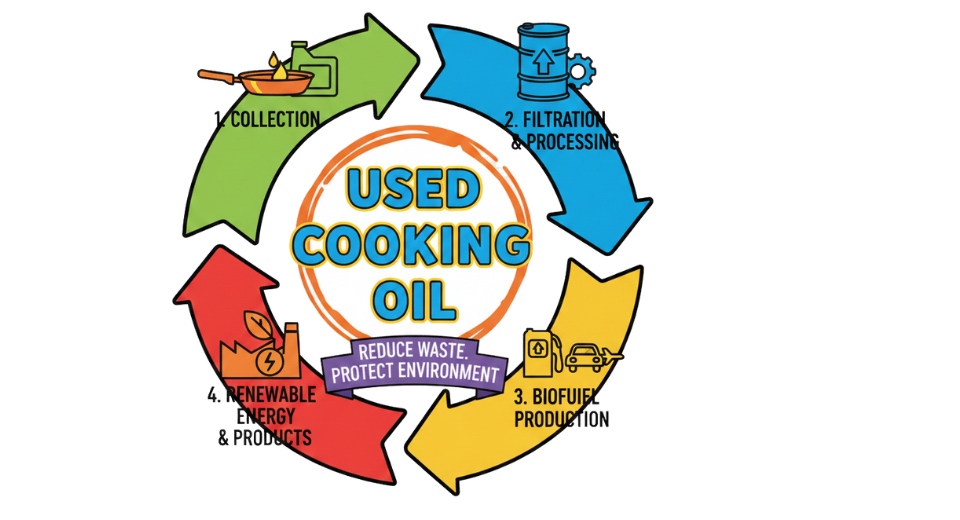
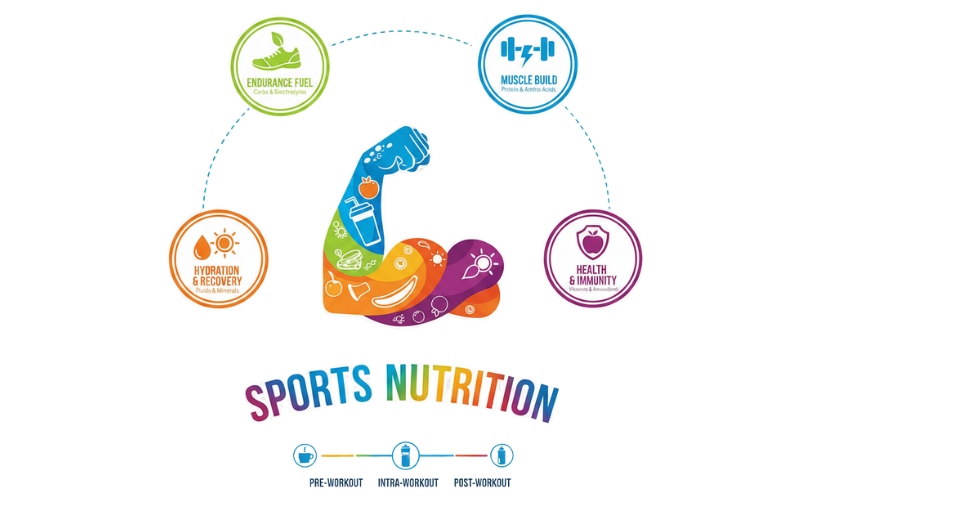
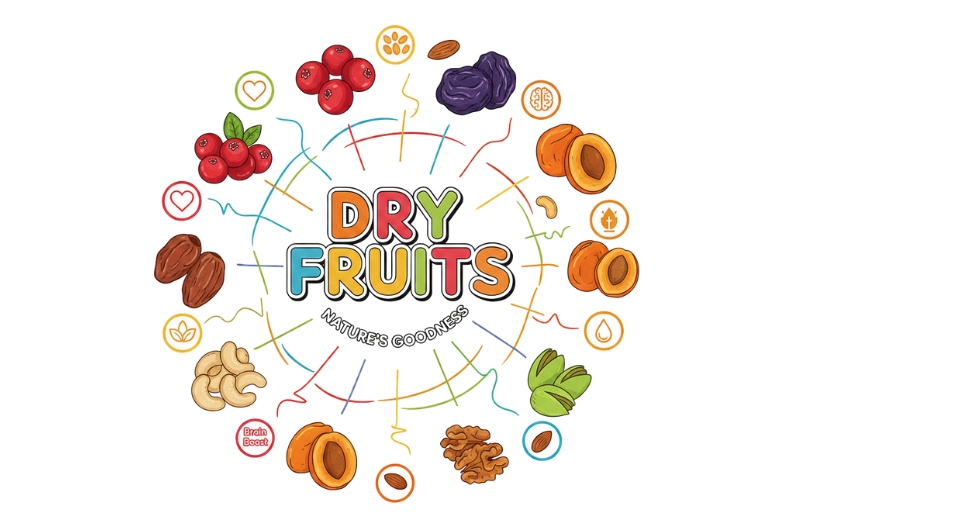

 US: +1 3023308252
US: +1 3023308252






